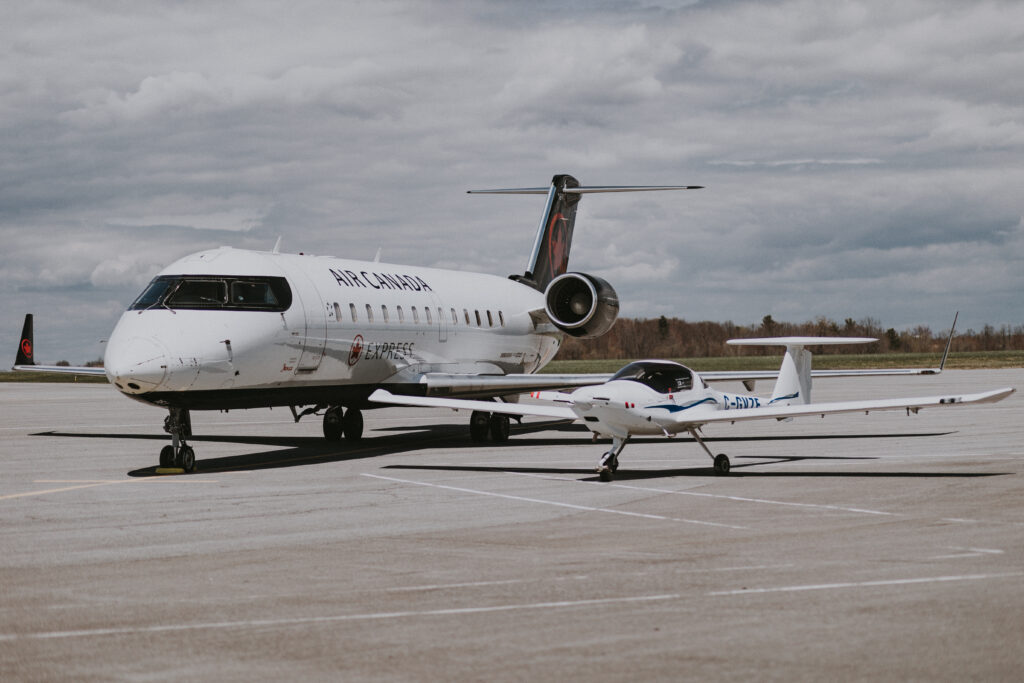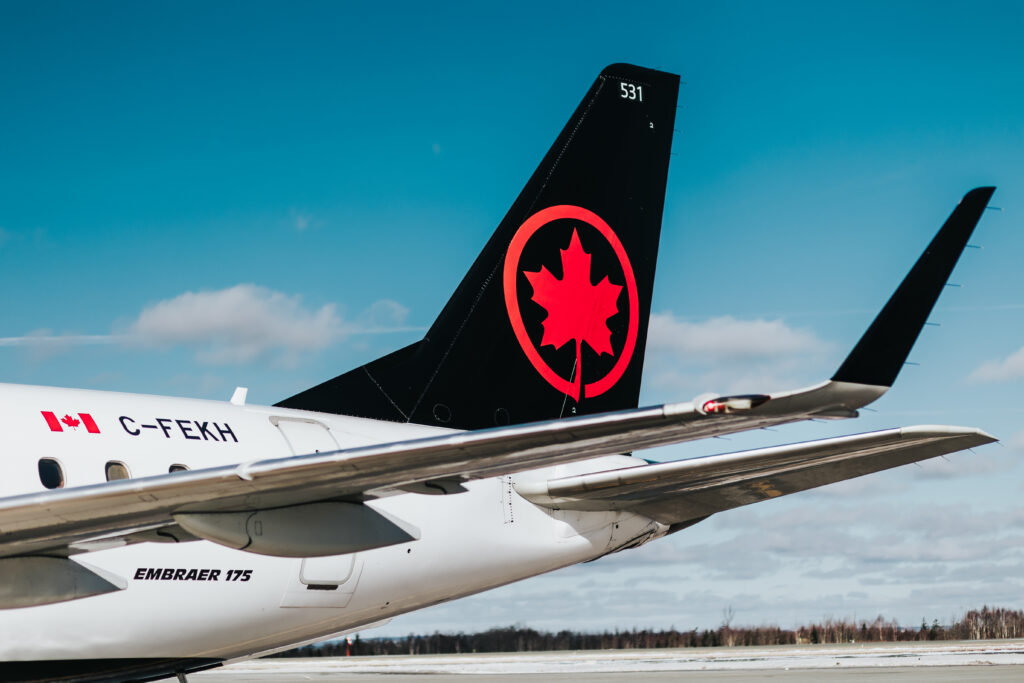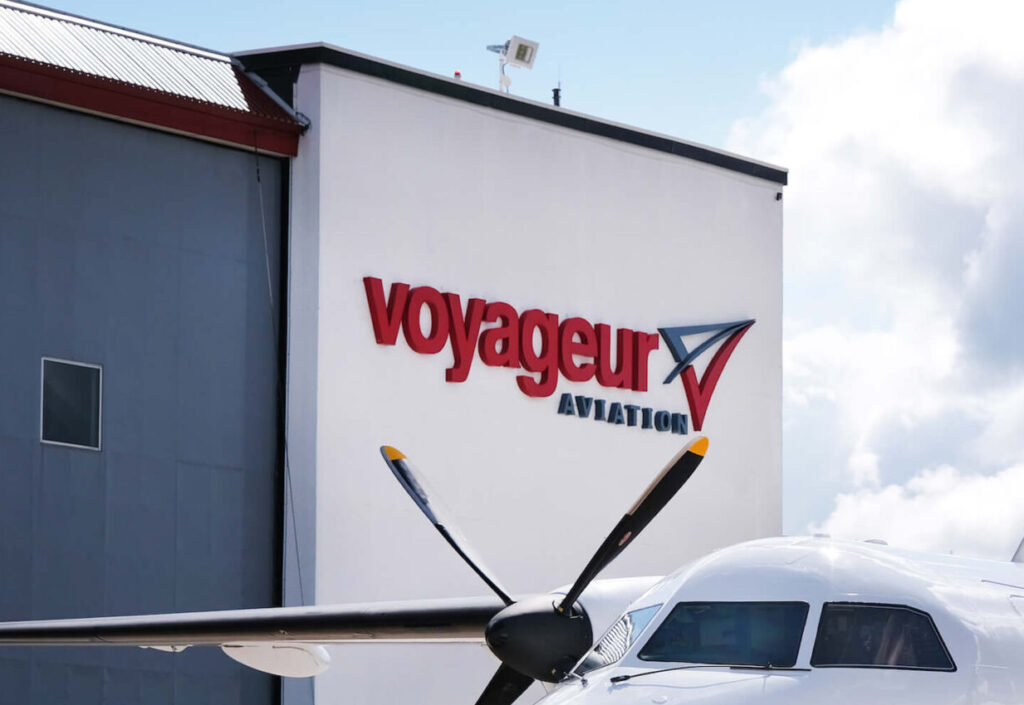Chorus Aviation Inc. finishes 2011 with positive results
Improved financial performance over 2010
Consistent quarterly profitability since 2006
HALIFAX, Feb. 20, 2012 /CNW/ – Chorus Aviation Inc. ("Chorus") (TSX: CHR.B CHR.A CHR.DB) today announced its fourth quarter and year end 2011 earnings, with a fourth quarter net income of $22.7 million or $0.18 per share, and adjusted net income1 of $19.6 million or $0.16 per share.
Q4 2011 HIGHLIGHTS
- Operating revenue of $407.7 million.
- Free Cash Flow1 of $29.4 million, or $0.24 per share.
- Operating income of $25.3 million.
- Net income of $22.7 million, or $0.18 per share.
- Adjusted net income1 of $19.6 million, or $0.16 per share.
YEAR END HIGHLIGHTS
- Operating revenue of $1.7 billion.
- Free Cash Flow1 of $106.8 million, or $0.87 per share.
- Operating income of $102.0 million.
- Net income of $68.1 million, or $0.55 per share.
- Adjusted net income1 of $71.7 million, or $0.58 per share.
"I'm pleased once again to report strong operational and financial results for both the last quarter and the year 2011," said Joseph Randell, President and Chief Executive Officer, Chorus. "We experienced a 22 percent increase in net earnings year-over-year due to increased flying volumes and a decrease in our unit costs due to good cost control. Looking back over the year, we completed our first full season of the Thomas Cook Canada operation and had a seamless startup of the second season. The best way to characterize 2011 is to say it was a demonstration of our ability to execute on a growing and changing operational plan."
"As always, safety was our priority and the dedication of our employees resulted in a steady improvement in operational performance, including the seamless transition of ten Q400s into the Jazz fleet," Mr. Randell went on to say. "Looking ahead, we will complete the remaining five deliveries on the Q400 fleet which we expect will have a future positive impact on key financial metrics such as EBITDA and Free Cash Flow while at the same time offer an improved product for passengers and a lower unit cost for our customer."
Financial Performance -Fourth Quarter 2011 Compared to Fourth Quarter 2010
Operating revenue increased from $392.7 million to $407.7 million, representing an increase of $15.0 million or 3.8%. The increase in operating revenue was primarily due to a $4.1 million or 2.7% increase in pass-through costs from $154.3 million to $158.4 million, which included $9.6 million related to fuel; offset by a decrease in airport and navigational fees and deicing. Passenger revenue, excluding pass-through costs, increased by $11.1 million or 4.7% primarily as a result of a higher US dollar exchange rate, a $2.5 million increase in incentives earned under the Capacity Purchase Agreement (CPA) with Air Canada, and rate increases made pursuant to the CPA which includes two additional Covered Aircraft added to the fleet; offset by a decrease in Billable Block Hours. Other revenue decreased by $0.2 million.
Total operating expenses increased from $374.6 million to $382.4 million, an increase of $7.8 million or 2.1%. Controllable costs increased by $3.7 million, or 1.7%, primarily as a result of costs associated with capacity growth, including $0.8 million associated with the introduction of the Q400 aircraft, consisting of crew salaries and benefits, and training costs.
Salaries, wages and benefits increased by $9.4 million due to the increased number of full time equivalent employees required to facilitate capacity growth, wage and scale increases under new collective agreements, increased pension expense resulting from a revised actuarial valuation, and increased incentive compensation expense.
Non-operating income amounted to $2.7 million, representing an increase of $12.8 million. This change was mainly attributable to a foreign exchange gain of $5.8 million (of which $3.1 million was related to an unrealized foreign exchange gain on long-term debt and finance leases) arising as a result of the change in value of the Canadian dollar relative to the US dollar, the absence in this quarter of any loss on derivative liabilities; offset by increased interest expense.
EBITDA1 was $38.0 million compared to $28.3 million in 2010, an increase of $9.7 million or 34.3%. Free Cash Flow was $29.4 million, an increase of $8.9 million or 43.4% from $20.5 million.
Operating income of $25.3 million for the three months ended December 31, 2011, was up $7.2 million or 40.1% over fourth quarter 2010 from $18.1 million. Net income for the fourth quarter of 2011 was $22.7 million or $0.18 per share.
Chorus Aviation Inc.'s audited financial statements for the year ended December 31, 2011, and accompanying Management's Discussion and Analysis (MD&A) are available at www.chorusaviation.ca and at www.sedar.com. A copy may also be obtained on request by contacting Investor Relations at: investorsinfo@chorusaviation.ca or (902) 873-5094.
Investor Conference Call / Audio Webcast
Chorus will hold an analyst call at 9:30 a.m. ET on Tuesday, February 21, 2012 to discuss the fourth quarter and year end results. The call may be accessed by dialing 1-888-231-8191. The call will be simultaneously audio webcast via: www.newswire.ca/en/webcast/viewEvent.cgi?eventID=3814140 or in the Investor Relations section at www.chorusaviation.ca. This is a listen-in only audio webcast. Media Player or Real Player is required to listen to the broadcast; please download well in advance of the call.
The conference call webcast will be archived on Chorus's Investor Relations website at www.chorusaviation.ca. A playback of the call can also be accessed until midnight ET, February 28, 2012, by dialing (416) 849-0833 or toll-free 1- 855-859-2056, and passcode 43650221# (pound key).
1 Non-GAAP Financial Measures
EBITDA
EBITDA (earnings before interest, taxes, depreciation, amortization and obsolescence) is a non-GAAP financial measure commonly used throughout all industries to view operating results before interest expense, interest income, depreciation and amortization, gains and losses on property and equipment and other non-operating income and expenses. Management believes EBITDA assists investors in comparing Chorus' performance on a consistent basis without regard to depreciation and amortization, which are non-cash in nature and can vary significantly depending on accounting methods and non-operating factors such as historical cost. EBITDA should not be used as an exclusive measure of cash flow because it does not account for the impact on working capital growth, capital expenditures, debt repayments and other sources and uses of cash, which are disclosed in the statement of cash flows which form part of the financial statements.
FREE CASH FLOW
Pre-conversion distributable cash was a key performance indicator used by management to evaluate the ongoing performance of Jazz Air Income Fund. Distributable cash is not a measure which is commonly utilized in respect of a public corporation. Management believes, however, that it is a term with which its shareholders are familiar and has provided Free Cash Flow as a proxy for previously reported distributable income. Free Cash Flow is calculated in the same manner as distributable cash.
ADJUSTED NET INCOME AND ADJUSTED EARNINGS PER SHARE
Adjusted net income and adjusted earnings per share are calculated by adjusting net income and basic earnings per share by the amount of any unrealized foreign exchange gains and losses. During the fourth quarter of 2011, Chorus recorded $3.1 million gain in unrealized foreign exchange on long-term debt and finance leases. This adjustment more clearly reflects earnings from an operating perspective.
Caution regarding forward-looking information
This news release should be read in conjunction with Chorus' audited consolidated financial statements for the year ended December 31, 2011 and MD&A dated February 20, 2012, filed with Canadian Securities regulatory authorities (available at www.sedar.com).
Certain statements in this news release may contain statements which are forward-looking statements. These forward-looking statements are identified by the use of terms and phrases such as "anticipate", "believe", "could", "estimate", "expect", "intend", "may", "plan", "predict", "project", "will", "would", and similar terms and phrases, including references to assumptions. Such statements may involve but are not limited to comments with respect to strategies, expectations, planned operations or future actions.
Forward-looking statements relate to analyses and other information that are based on forecasts of future results, estimates of amounts not yet determinable and other uncertain events. Forward-looking statements, by their nature, are based on assumptions, including those described below, and are subject to important risks and uncertainties. Any forecasts or forward-looking predictions or statements cannot be relied upon due to, amongst other things, changing external events and general uncertainties of the business. Such statements involve known and unknown risks, uncertainties and other factors that may cause the actual results, performance or achievements to differ materially from those expressed in the forward-looking statements. Results indicated in forward-looking statements may differ materially from actual results for a number of reasons, including without limitation, risks relating to Chorus' relationship with Air Canada or Thomas Cook Canada Inc., risks relating to the airline industry, energy prices, general industry, market, credit, and economic conditions, competition, insurance issues and costs, supply issues, war, terrorist attacks, epidemic diseases, acts of God, changes in demand due to the seasonal nature of the business, the ability to reduce operating costs and employee counts, secure financing, employee relations, labour negotiations or disputes, restructuring, pension issues, currency exchange and interest rates, leverage and restructure covenants in future indebtedness, dilution of Chorus shareholders, uncertainty of dividend payments, managing growth, changes in laws, adverse regulatory developments or proceedings, pending and future litigation and actions by third parties. The forward-looking statements contained in this discussion represent Chorus' expectations as of February 20, 2012, and are subject to change after such date. However, Chorus disclaims any intention or obligation to update or revise any forward-looking statements whether as a result of new information, future events or otherwise, except as required under applicable securities regulations.
About Chorus Aviation Inc.
Chorus Aviation Inc. ("Chorus") was incorporated on September 27, 2010 and is a dividend-paying holding company which owns Jazz Aviation LP, Chorus Leasing I Inc. and Chorus Leasing II Inc. (the leasing companies own the Q400 aircraft) and 7503695 Canada Inc. (which holds Chorus' investment in Latin American Regional Aviation Holdings Corp., which in turn holds a 75% indirect equity interest in South American regional carrier, Pluna).
Chorus is traded on the Toronto Stock Exchange under the trading symbols of CHR.A, CHR.B and CHR.DB.
About Jazz Aviation LP
Jazz Aviation LP has a strong history in Canadian aviation with its roots going back to the 1930s. Jazz is wholly owned by Chorus Aviation Inc. and continues to generate some of the strongest operational and financial results in the North American aviation industry.
There are three airline divisions operated by Jazz Aviation LP: Air Canada Express, Thomas Cook Canada and Jazz.
Air Canada Express: Under a capacity purchase agreement with Air Canada, Jazz provides service to and from lower-density markets as well as higher-density markets at off-peak times throughout Canada and to and from certain destinations in the United States. Jazz currently operates scheduled passenger service on behalf of Air Canada with over 790 departures per weekday to 83 destinations in Canada and in the United States with a fleet of Canadian-made Bombardier aircraft.
Thomas Cook Canada: Jazz operates Boeing 757-200 aircraft on behalf of Thomas Cook Canada in the winter season to various destinations in the Caribbean, Mexico and Central America from Canadian gateways.
Jazz: Under the Jazz brand, the airline offers charters throughout North America with a dedicated fleet of five Bombardier aircraft for corporate clients, governments, special interest groups and individuals seeking more convenience. Jazz also has the ability to offer airline operators services such as ground handling, dispatching, flight load planning, training and consulting.
For more information, visit www.flyjazz.ca.



